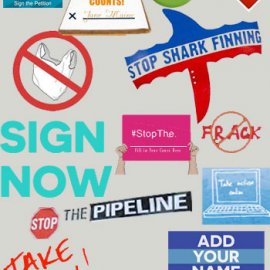Petitions
-
English
-
ListenPause
I’m Peter Neill, Director of the World Ocean Observatory. My World Ocean Observatory mailbox is filled every day with messages from ocean organizations around the world. Given the wide range of issues included in our interest in the ocean as an integrated global social system, our interest in ocean impact on climate, fresh water, food, energy, health, trade, transportation, security, policy, development, cultural traditions, and more, you can image the number of messages received – each urgent, each compelling, each necessary if we are to address the comparable range of challenges to a healthy and sustainable ocean every day. Advocates for change have various strategies available to promote their cause and ideas. They can legislate, litigate, demonstrate, and otherwise indicate through traditional methods and behaviors solutions to the problems that vex them. Following this dynamic social and political process can be overwhelming – by the volume of ideas, proposals, and communications—but also by the sense of futility and frustration each of us feels personally when our issue is thwarted or collectively when our issue is ignored or defeated by the conventional opponents of change. Certain campaigns are exemplary. 350.org has been working relentlessly to advance public awareness of the negative impacts of emissions, warming, and climate change. Through pervasive social messaging, conferences and gatherings, protests and marches, in the United States and abroad, the 350 Campaign has innovated and set new expectations for the opportunity to express opinion and urge change beyond the letters to editors and elected representatives, op-ed pieces, and other public manifestations in opposition to some status quo. In the context of this, 350.org has focused on the prospective decision regarding the Keystone pipeline, a n ear-term project that embodies all the considerations regarding natural resource extraction, tar sands and fracking, transportation and environmental hazards and polluting accidents, employment and financial issues, export distribution emphasis, challenges to existing regulatory structure, policy contradictions, compromise of alternative technologies, and disruption of communities along the route. The Keystone decision contains all these complexities and more, all the power of vested interest versus conservation interest, all the influence of lobbyists and shareholders versus the imagination of inventors and change agents, all the arguments and statistics put forward to advance one side of the argument or the other. The 350 Campaign will find its most fervid expression in September when hundreds of thousands, perhaps a million or more of its sympathizers will gather in New York City to express their opposition to this very real and very symbolic decision that will, no doubt, be forthcoming from President Obama predictably after the fall election. World Ocean Radio will be there to report. That said, we must also be aware that even this may not make a difference. Perhaps a million people protesting in the streets is not enough anymore. A blip in the news cycle. A political aberration easily forgotten. In an earlier edition of World Ocean Radio, I advocated the idea that we could expand the audience for this or any other issue through the power of social media. My idea was to “occupy” the servers at the White House with messages advocating that the US President dedicate his last years in office to a powerful campaign of advocacy, legislative proposal, regulatory enforcement, and executive order addressing climate change and its associated impacts as the single most important issue on the world agenda. I confess this so-called bright idea went nowhere. But the petition concept had gone somewhere – with regard to international restrictions on whaling in the Antarctic, seal killing in Canada, or dolphin slaughter in Japan where a combination of social media and new communications tools have galvanized public disapproval, even outrage, and made a difference. The most recent manifestation of this is the collapse of the shark fin market in China where images and internet messaging has generated thousands of petition signatures, vital coverage of the phenomenon, and impact on harvesters, distributors, and purveyors that has caused a cherished dish and food ritual to be abandoned. Photographs of rank after rank of drying shark fins on the roofs of Hong Kong have dissuaded consumers, even government officials, to change. W2O shares these petitions on its FaceBook page and encourages everyone to sign. We signed the shark fin petition and wondered what difference it might make. But our commitment, matched with so many others, did unite into a loud and effective voice. It’s an old idea, the petition, l imited in many ways, but perhaps now via the emerging world ocean community, its time has come as a global megaphone and instrument of change, a measurable and enduring voice for climate and the ocean. We will discuss these issues, and more, in future editions of World Ocean Radio.
Mailboxes fill each day with messages from advocacy organizations with petitions promoting a variety of important causes and ideas. Certain campaigns are hugely successful thanks to the power of social media and the speed with which information travels around the globe. In this episode of World Ocean Radio, host Peter Neill will discuss the evolution of the petition concept and outline some of the most successful international campaigns that have and are making a global difference for climate and the ocean.
About World Ocean Radio: Peter Neill, Director of the World Ocean Observatory and host of World Ocean Radio, provides coverage of a broad spectrum of ocean issues from science and education to advocacy and exemplary projects. World Ocean Radio, a project of the World Ocean Observatory, is a weekly series of five-minute audio essays available for syndicated use at no cost by college and community radio stations worldwide.
World Ocean Radio Has Gone Global: A selection of episodes is now available in Portuguese, Spanish, French, and Swahili. For more information, visit http://www.worldoceanobservatory.org/world-ocean-radio-global.
Contact us for more information.
- Login to post comments



